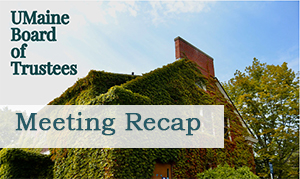On Mar. 22, 2021, the University of Maine System held its monthly board of trustees meeting. The meeting lasted from 8 a.m. until late into the afternoon.
The public portion of the meeting commenced with citizen comment. During the majority of this section individuals spoke about UMaine’s effort towards full divestment of fossil fuels. The speakers included students as well as staff members.
The speakers encouraged UMaine to take a firm stance on climate change and remove the more than $11 million invested in fossil fuel corporations.
The chancellor’s report for this month’s meeting was mostly positive, as Chancellor Dannel Malloy shared that the school feels moving toward weekly testing has been very beneficial. Positive test results have been low until a slight uptick in recent weeks.
Malloy then introduced Vice Chancellor for Finance and Administration and Treasurer Ryan Low who provided a brief update of the University of Maine System’s finances. As of now, the fiscal year 2021 has been mostly positive with only small losses compared to 2020.The financial forecast predicts that there will be some decreases in revenue due to less on-campus dining as well as increased expenses due to the coronavirus. The budget suggests the use of approximately $24 million to balance out the fiscal year 2021.
Robert Placido, vice chancellor of academic affairs, reported that the UMaine campuses are expecting to have full occupancy of both residence and dining halls in the upcoming fall semester. The number of applications for fall 2021 has started to rise again and application turnaround time is up from previous years, meaning that admissions are ahead. “Early acceptance with an award is happening 2-3 months earlier than average,” Placido said. “We are almost 9% ahead.”
Enrollment for 2021’s spring semester was down 2% from the year prior, however; public education has declined 4% nationally, especially in community colleges. Employment numbers have slightly decreased, while graduate school enrollment has increased by 20% this spring.
During the meeting, the trustees voted on the formal acceptance and administration of the Harold Alfond Foundation grants. It has been decided that the grant of $240 million will be divided into four major investment pools including Black Bear Athletics, Student Success and Retention, the Maine College of Engineering, Computing, and Information Science and the Maine Graduate and Professional Center.
The board hopes that with these grants, UMaine’s campus can become a destination for the other schools in the University of Maine System as well as Maine grade schools. With the grant, UMaine can offer space for outside programs and athletic events on campus, establishing UMaine as a community hub.
The motion to accept the grants and the administration of the funds passed unanimously.
President Rebecca Wyke spoke during the meeting on behalf of the University of Maine at Augusta’s (UMA’s) Prisoner Education Program. UMA is 1 of 133 higher education organizations that offer education to incarcerated individuals.
“I am no longer afraid to return to prison,” a 2018 graduate of the program said in the meeting. “But rather inspired not to.”
After receiving his Bachelor of Arts from UMA, this student from Bolduc Correctional Facility is now a Ph.D. candidate.
The Prisoner Education Program at UMA has been running since 2006 with 140 graduates and a 5% recidivism rate. It offers both associate and bachelor’s degrees in liberal studies such as philosophy, women’s, gender, and sexuality studies, and literature.
The program is run primarily with funding from second-chance Pell Grants and other private funds like that of the Andrew W. Mellon Foundation, which offered UMA a two-year grant of $950,000. UMA recently applied for a Pell Grant expansion in hopes of offering programs at all of Maine’s correctional facilities.
Maine and its universities are looking forward to a project that has been in progress since 2006 called the UMaine New England Aqua Ventus Offshore Wind Project. The goal of the project is to demonstrate at a commercially viable scale, the possibilities of offshore wind power for Maine.
The project has been under development since 2006. The end-stage means building a floating wind turbine platform offshore, with an expected installation date of 2023 — this is referred to as the Mohegan Demonstration project. Once installed, it will settle into a grid with Central Maine Power for a 20-year trial period. The Aqua Ventus project has been made possible with 13 grants equaling more than $20 million, along with funding from the Economic Development Administration.
Overall, the March 2021 University of Maine System Trustee meeting promised a number of changes and projects for both the near and distant future.








